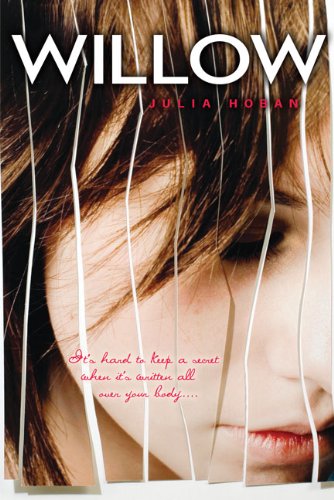All Nonfiction
- Bullying
- Books
- Academic
- Author Interviews
- Celebrity interviews
- College Articles
- College Essays
- Educator of the Year
- Heroes
- Interviews
- Memoir
- Personal Experience
- Sports
- Travel & Culture
All Opinions
- Bullying
- Current Events / Politics
- Discrimination
- Drugs / Alcohol / Smoking
- Entertainment / Celebrities
- Environment
- Love / Relationships
- Movies / Music / TV
- Pop Culture / Trends
- School / College
- Social Issues / Civics
- Spirituality / Religion
- Sports / Hobbies
All Hot Topics
- Bullying
- Community Service
- Environment
- Health
- Letters to the Editor
- Pride & Prejudice
- What Matters
- Back
Summer Guide
- Program Links
- Program Reviews
- Back
College Guide
- College Links
- College Reviews
- College Essays
- College Articles
- Back
Willow by Julia Hoban
You’re a helpless and grief stricken young girl, struggling to cope with self-harm, and your only hope of recovery rests in the hands of… a stereotypical love interest? Willow written by Julia Hoban depicts the hardships of sixteen year-old Willow Randall as she deals with the guilt of having accidentally caused the deaths of her parents. Despite the plot’s promise, this novel merely comes off as cliché and over-exaggerated, rather than empowering or inspiring.
The largest issue I had with Willow as a novel was the idea is emphasizes- that a girl needs a perfect boyfriend in order for her to hold any meaning. Willow’s life seems completely hopeless before the charming and intelligent Guy appears with a strange desire to fix all of Willow’s problems for her. This is in no way realistic, and sends an absolutely horrible message to readers.
Furthermore, nearly all of the characters in Willow are irritating and lacking in characterization. Willow herself remains near painfully pessimistic and stubborn throughout the novel, not seeming to have grown the slightest bit. She frequently belittles the problems of those around her, in one instance even calling a girl weak because she cries after dropping and breaking a science project.
Even worse is Guy, who is just about as creepy as he is impossibly perfect. Not only is he unnecessarily and strangely kind to Willow without motive, as well as unbelievably intelligent, manly, charming and obscure all at once, but his relationship with Willow is highly unhealthy as well. Guy does things such as grab Willow’s arm as she tries to walk away from him, and call her his “lover,” as well as pressure her into making decisions she’d clearly rather not make.
The writing style of the novel is also less than satisfactory. Willow is told in third person, rather than first, which often causes certain scenes that should be emotional and cause the reader to sympathize with the protagonist instead to feel repetitive and distance the reader from the protagonist. The novel also lacks colorful adjectives or imagery of any sort, telling only the bare minimum about any of the settings within the novel, which takes away from the experience of reading in itself and makes it hard for the reader to picture the story within their mind. For example, when Willow and Guy first enter the stacks in the library, a rather important location throughout the novel, all that is said in the way of description is, “The stacks are dark.” The appearance of the stacks is not further elaborated on afterwards, save for the rare instance when they are described as “metal”.
It is for these reasons that I highly suggest not wasting the effort needed to so much as pick Willow off the shelf, and to instead perhaps spend your time reading something, to quote the novel itself, “better than mother’s milk.”
Similar Articles
JOIN THE DISCUSSION
This article has 0 comments.

